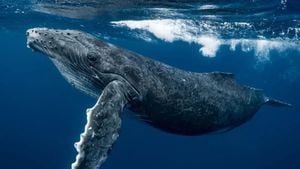Ocean acidification is quietly reshaping the marine world, extending its effects from the surface down to depths as great as 13,000 feet. This shift not only threatens marine biodiversity but also alters the very fabric of ocean ecosystems.
Research indicates the carbonate compensation depth, where conditions become so acidic they dissolve shells and skeletons, could comprise half of the global ocean by the century's end. Stronger tides and increasing carbon emissions are forcing this acidic domain to grow, impacting countless marine species reliant on calcium carbonate.
Known as the carbonate compensation depth, this fluctuates with rising ocean carbon dioxide levels, leading to more day-to-day variability. The rising concentration of CO2 is directly connected to the declining pH levels, indicating the ocean absorbs excess atmosphere gases faster than it can adapt.
By absorbing more carbon dioxide, the ocean's chemical properties change. This influences how animals, from tiny plankton to massive whales, will thrive or possibly perish.
The connection between surface ocean acidification and deep-sea changes is often overlooked. The dissolution of calcium carbonate impacts creatures ranging from corals to mollusks, threatening their survival and the habitats they provide.
According to findings published by researchers, the depth at which calcium carbonate begins to dissolve—the lysocline—has been steadily rising. Today, it has shifted nearly 100 meters upward compared to pre-industrial times, compounding challenges for marine wildlife.
This rise is significant because it signifies rapid transitions where vast areas of the ocean floor could become chemically unstable. Indeed, high pressure and cold temperatures at these depths create conditions hazardous for species dependent on carbonate structures, such as corals and certain fish types.
Recent studies indicate the total area impacted by this acidification may reach around 41% of the deep ocean, with projections showing this could increase to 51% by century-end. Scientists highlight the gravity of this issue, likening it to major perturbations experienced during previous extinction events.
The physiological effects of acidification are multi-faceted, influencing growth, reproductive success, and survival rates of marine organisms. For example, organisms like the Maugean skate face dire situations due solely to deteriorated environmental conditions caused by industrial activities.
A specific focus is on the Maugean skate, which has recently hatched from captive eggs as part of conservation efforts at the University of Tasmania. This skate thrives in Macquarie Harbour, where reduced dissolved oxygen levels from intensive salmon farming have wreaked havoc on the ecosystem.
Dr. Jayson Semmens remarked on the breeding program's importance, stating, “We’re investigating how to prepare these skates for their natural habitat.” This reiterates the pressing need to address contributing factors to environmental degradation, prominently highlighting salmon farming.
Industry leaders have expressed skepticism about findings linking salmon farming to ecological harm, questioning the methodologies of studies claiming such impacts. Nonetheless, local marine biologists like Lawrence Chlebeck argue for substantial reductions of intensive farming practices to restore Macquarie Harbour's health.
Some oceanic regions, particularly among island nations, face heightened impacts from the rising calcite compensation depth. For Bermuda, projections estimate 68% of its seabed may fall below the lysocline, devastating local marine life.
Contrastingly, larger countries like the United States and Russia fare better, with only modest projections of seabed submersion under recent trends. These disparities reveal the unequal burdens bearing down on island nations where ocean biodiversity is already fragile.
The economic aspects tied to these changes also are significant—navigational routes, fisheries, and tourism depend on healthy oceans. Notably, rising sea acidity can lead to the collapse of fisheries reliant on shelled species, undermining livelihoods and food security.
There’s more to this story than just numbers. The functioning of marine ecosystems—their health, sustainability, and the services they provide—is under threat from ever-increasing ocean acidification.
Scientists and conservationists are sounding the alarm on integrating carbon management strategies with marine stewardship. The goal is to find balance and commit to preserving the integrity of ocean ecosystems.
Leneka Rhoden, recently appointed to the Deep-Ocean Stewardship Initiative, is among those forging paths for better ecological practices. Participting scientists globally advocate for ecosystem management strategies aimed at protecting marine resources by applying innovative policies.
Linking scientific research with practical eco-management must expand for effective action. Without addressing the root causes of ocean acidification, the future threatens to tilt unacceptably toward ecological collapse.
The deep ocean—is it on the frontline of climate change? Understanding its changes will yield insights critical to our broader environmental conversation as we navigate these stormy seas.



